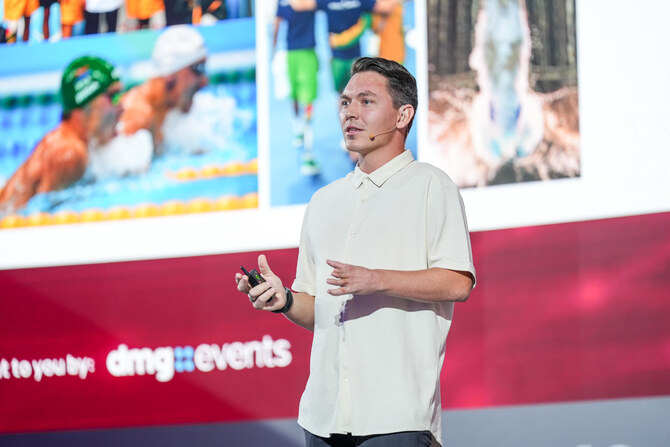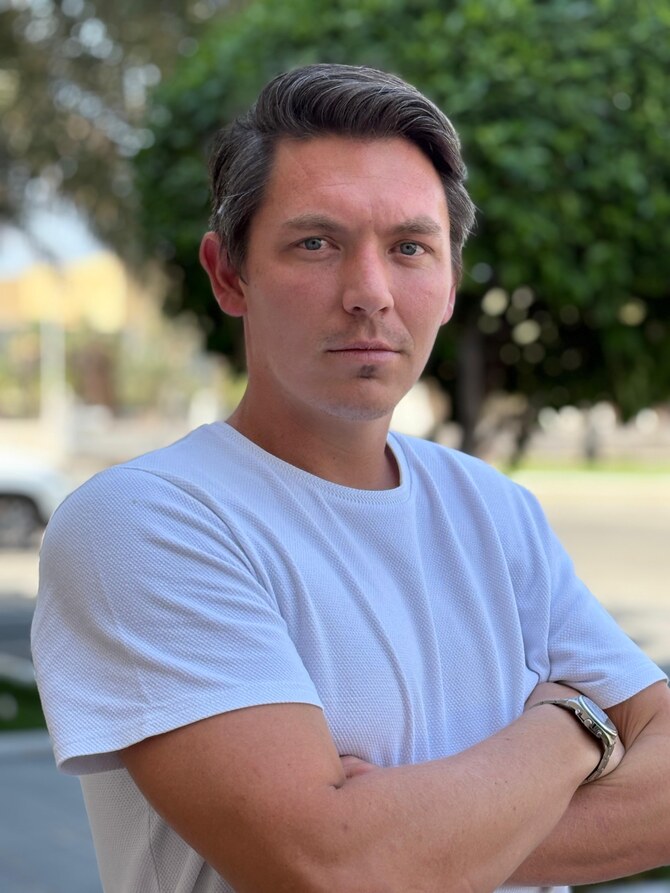RIYADH: Kevin Paul, a decorated Paralympic swimmer from South Africa, is not only passionate about his athletic achievements but also deeply committed to shaping the future of youth sports in Saudi Arabia.
In an exclusive interview with Arab News, Paul shared his vision for sports education in the Kingdom, the role of his organization Nujoom, and how the growing scene in Saudi Arabia is creating opportunities for the next generation.
Born and raised in South Africa, where sport is a significant part of life, Paul has always viewed athletics as a powerful tool for personal growth. “Sport has always been an outlet for me,” he said.
“It’s always been an opportunity, and it’s always given me so much to be able to fall back on — whether it’s in business, relationships, or friendships. Every major milestone in my life has been linked to sport.”
As a Paralympic athlete, Paul understands the resilience and determination needed to overcome challenges.

Kevin Paul has won a gold medal at the 2016 Rio Paralympic Games. supplied
After winning a gold medal at the 2016 Rio Paralympic Games and then retiring from competitive swimming, Paul found himself at a crossroads — to either embark on a legal career he had studied for or pursue his passion for sport.
He chose the latter, moving to Dubai and eventually seeing the potential for sports education in Saudi Arabia, especially with the launch of Vision 2030.
“I feel that when the opportunity came for me to be able to do that in Saudi, I wanted to grab it as soon as possible,” Paul said, adding that the Kingdom has so much potential, and he wants to be a part of the future here.
One of the main vehicles for Paul’s mission in Saudi Arabia is Nujoom, a sports education organization he co-founded with Abdullah Alireza, a top Saudi professional triathlete.
They aim to bring high-quality, accessible opportunities to the Kingdom, aligning their efforts with Vision 2030’s focus on sports development.
“If you look at it from the Nujoom side of things, we want to be able to provide accessibility and provide our opportunity for sport to all,” Paul said. “It’s that little ripple effect, if you make that one change now, it’s just going to have an impact for generations to come.”
With Saudi Arabia investing heavily in high-end sports events and infrastructure, Paul highlights the critical importance of grassroots initiatives.
Grassroots sports are just as crucial as the big events in football and boxing, he explained. “If we can inspire parents to fall in love with sports, their kids will naturally benefit from that.”
For Paul, the most exciting aspect of Saudi Arabia’s sports transformation is the drive and determination he sees in the people, which he likens to his home country of South Africa.
“People here are very determined and resilient. They go after what they want,” he said. “If you’re looking back five or 10 years ago, maybe these goals didn’t exist because the opportunities weren’t there.
“But now the kid playing football in the park behind the house, he believes he can be the next (Cristiano) Ronaldo,” he added.
Paul also celebrates the transformation in Saudi Arabia for women and girls, emphasizing that inclusivity is key to the country’s growing sports landscape.
“That’s just going to pave the pathway for whatever kids want to do moving forward,” he said. Participation in physical activities help teach children life lessons such as resilience, goal-setting and teamwork that they can apply to every aspect of their lives, he added.
The paralympic athlete’s love for swimming led him to create one of the Kingdom’s most exciting sports initiatives, a mixed open-water swim group.
When he moved to Jeddah, he thought “there must be other people who have that same love for swimming as I do. Let’s start an open-water swim club like you have run clubs and cycle clubs.”
The club has now grown to 75 members, coming from diverse backgrounds and sharing a love for the water. “It’s a lot more than just swimming in the ocean,” Paul said.
“We’re breaking boundaries, making friends, and creating a healthy, active community. It’s the ripple effect — start with one change, and it grows into something much bigger."
The group meets every Saturday for open-water swims followed by coffee, fostering a sense of community. People will meet others from different walks of life, and it is not just about fitness, but also connecting with others who share a passion.

Kevin Paul has always viewed athletics as a powerful tool for personal growth. supplied
As a Paralympic athlete, Paul is particularly sensitive to the challenges faced by youth with disabilities in pursuing sports. He believes that education and structured programs are essential to ensuring these athletes receive the support they need to succeed.
He said one of the biggest challenges for youth with disabilities in Saudi Arabia when it comes to pursuing sports is ensuring that both youth and coaches understand what it takes to become the best.
Paul stresses the importance of making sure coaches have the necessary qualifications and experience to guide young athletes effectively. Private sector organizations like Nujoom can play a significant role in providing top-tier coaching, but high-level programs are needed.
He said Nujoom focuses on four key pillars: fun, learning, structured curriculum, and qualified coaches.
Paul said children need to have a clear learning pathway, and to progress at their own pace, whether they are doing so for recreation or preparing for the Paralympics.
He shared a powerful lesson from his experience at the 2012 London Paralympic Games, where he played a game of Jenga with a teammate Hendri Herbst, who is visually impaired.
“Hendri taught me that he didn’t want sympathy; he just wanted equal respect and opportunity,” Paul recalled. The biggest lesson he took away from that was to make the most of a situation, work toward goals, and ask people for help.
Paul and the team at Nujoom want to ensure that in 10 to 15 years the top athletes will be homegrown. “All the posters on the walls of kids’ rooms should be of Saudi born-and-bred athletes moving forward.”





























